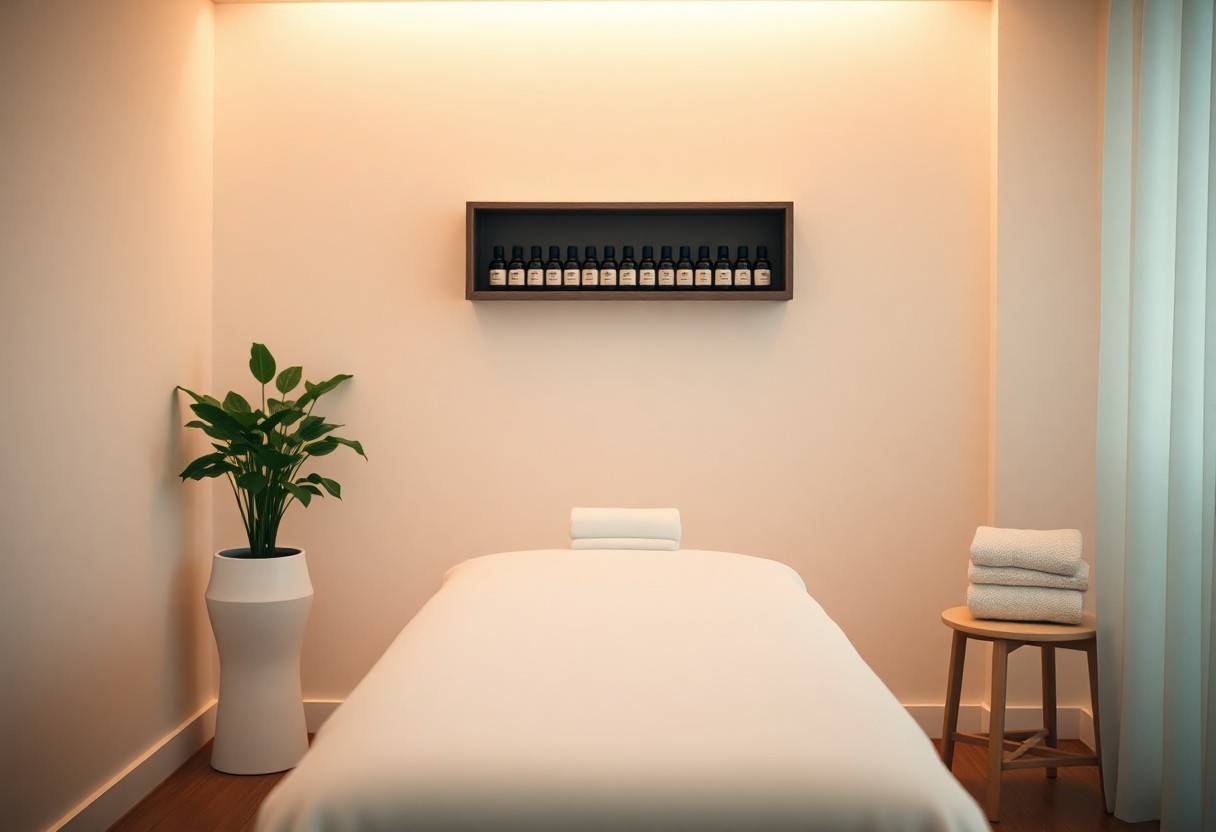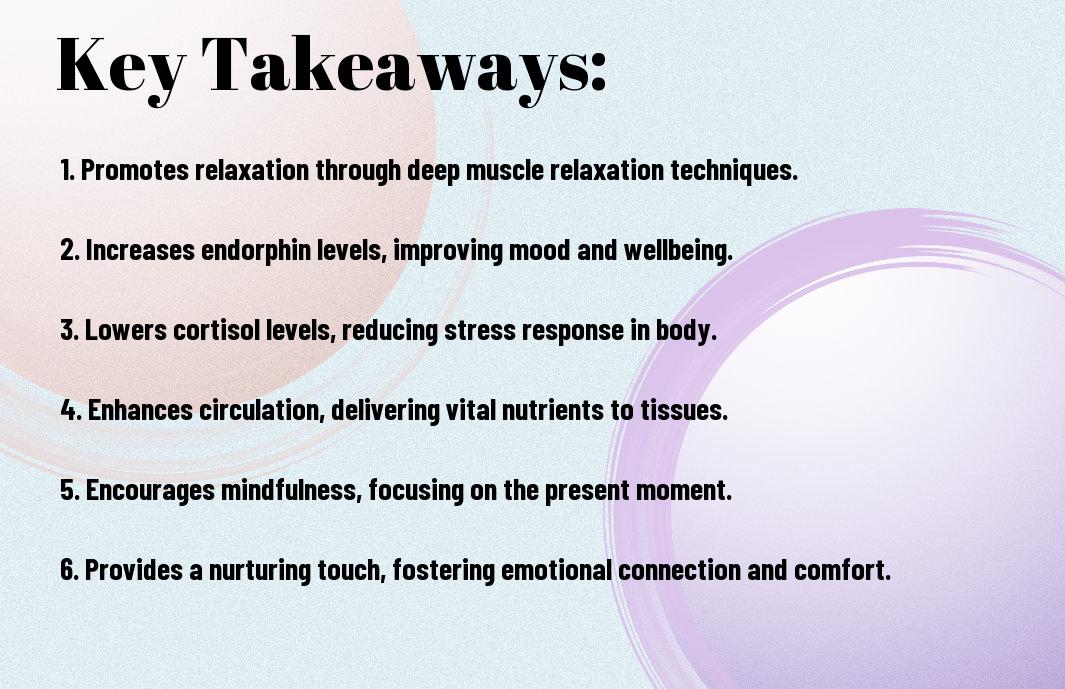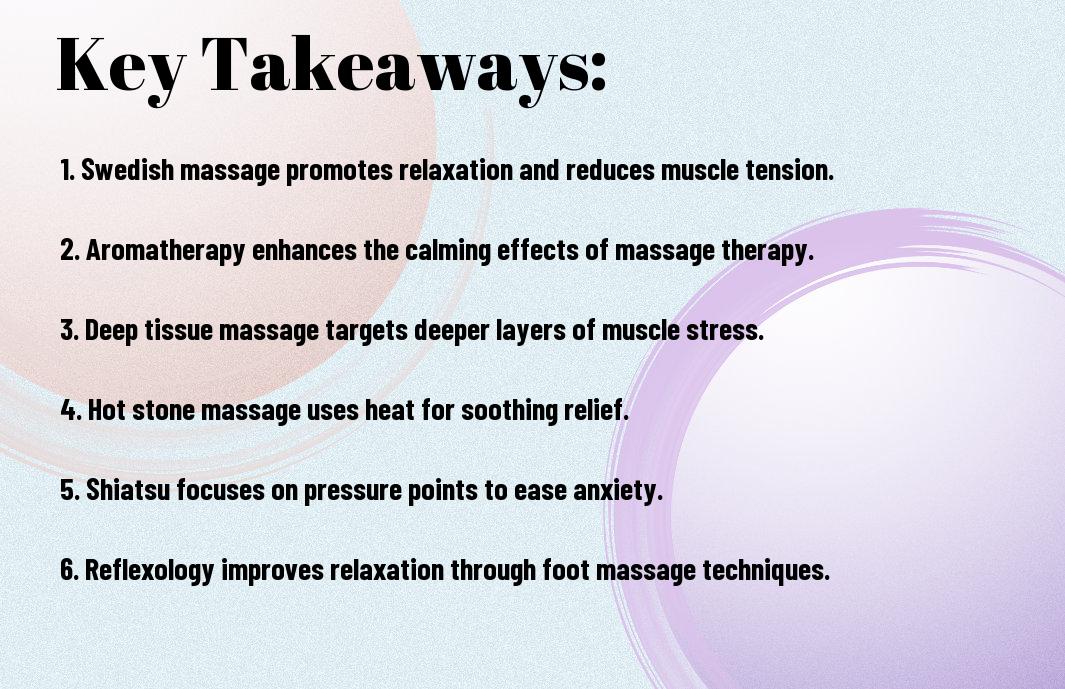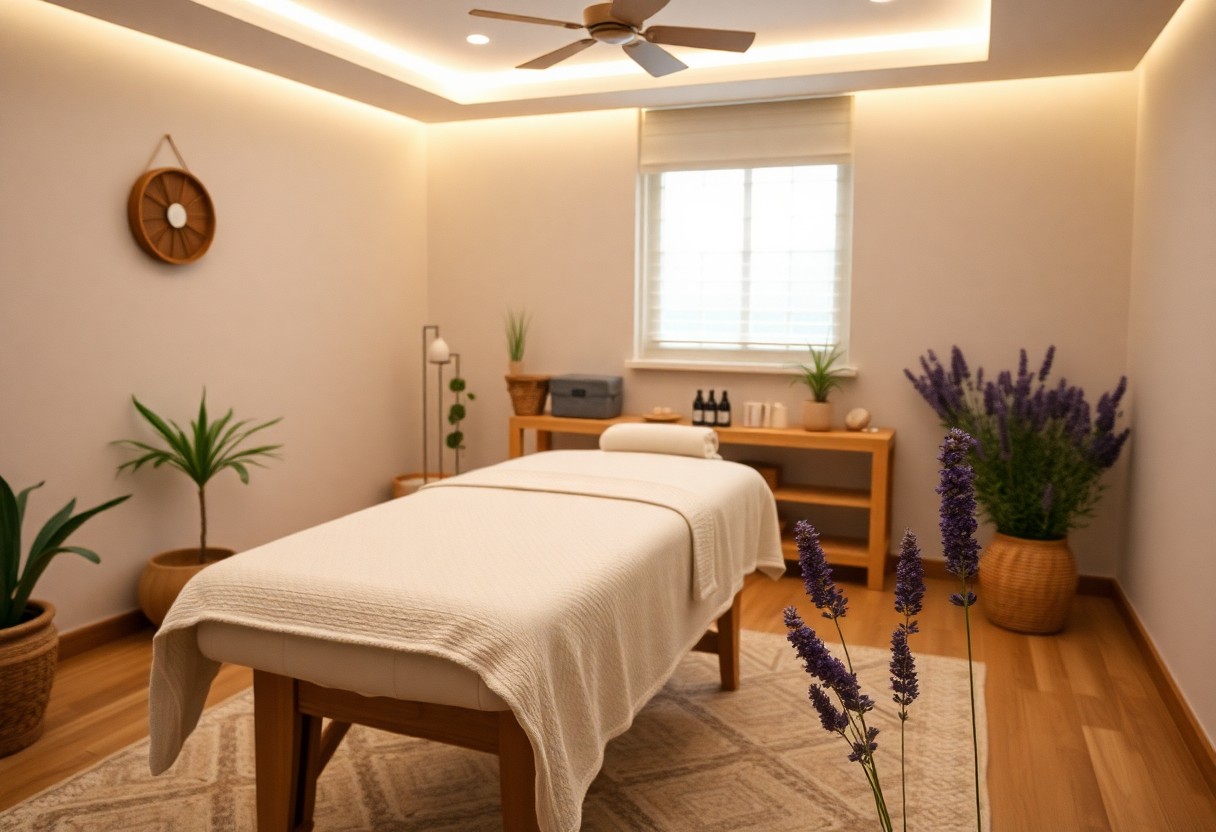Just as your body needs physical care, your mind requires attention too. Engaging in regular massage therapy can significantly reduce stress and anxiety by promoting relaxation and enhancing your overall well-being. By targeting muscle tension and increasing circulation, massage releases endorphins and lowers cortisol levels, creating a tranquil environment that helps you feel more balanced and in control. In this post, you’ll discover how incorporating massage into your routine can effectively alleviate stress and improve your mental health.
Key Takeaways:
- Releases Tension: Massage helps to relax tight muscles, which can alleviate physical discomfort and promote a sense of relaxation.
- Boosts Mood: The practice increases the release of endorphins, the body’s natural feel-good chemicals, contributing to a more positive emotional state.
- Lowers Cortisol Levels: Regular massages can help decrease cortisol, a stress hormone, leading to a reduction in overall stress and anxiety levels.
- Enhances Sleep Quality: By promoting relaxation, massage can improve sleep patterns, helping individuals feel more rested and less anxious.
- Facilitates Mindfulness: The sensory experience of massage encourages mindfulness, allowing individuals to focus on the present moment and reduce racing thoughts.
The Physiological Effects of Massage
As you explore the ways massage can alleviate stress and anxiety, it’s vital to recognize its physiological effects. Massage therapy engages your body’s natural responses, promoting relaxation and balance. Through techniques that target muscle tension and enhance circulation, you can experience a significant reduction in stress-related symptoms. This holistic approach not only nurtures your physical well-being but also contributes to your emotional stability, guiding you towards a healthier and more serene state of mind.
Reduction of Cortisol Levels
An necessary benefit of massage is its ability to reduce cortisol levels in your body. Cortisol, often referred to as the stress hormone, can negatively impact your physical and emotional health when elevated. By regular massage therapy, you activate your relaxation response which helps to decrease cortisol production. Lowering this hormone can lead to improved mood and emotional resilience, making you better equipped to handle daily stressors.
Increase in Serotonin and Dopamine
Physiological responses to massage also include an increase in serotonin and dopamine levels, two neurotransmitters that play a significant role in regulating mood and emotional well-being.
It is important to note that balancing serotonin and dopamine can significantly affect how you feel. Increased levels of serotonin can elevate your mood, reduce feelings of anxiety, and enhance your overall sense of well-being, while dopamine contributes to feelings of pleasure and motivation. When you receive massage therapy, the stimulation of these neurotransmitters can create a powerful support system for your mental health, helping you reduce stress and enhance your emotional resilience. This powerful combination contributes to a more balanced, happier you.
Psychological Benefits of Massage
Some of the most notable psychological benefits of massage include its profound effects on reducing stress and enhancing emotional well-being. As your body relaxes through skilled touch, your mind begins to feel weight lifted and concerns eased. This holistic approach not only promotes relaxation but also fosters mental clarity and emotional stability, helping you to navigate life’s challenges with greater ease.
Alleviation of Anxiety Symptoms
Benefits of massage therapy extend to alleviating anxiety symptoms. Regular sessions encourage a state of relaxation that allows your body to decrease levels of cortisol—often referred to as the stress hormone. As this tension eases, you may find yourself experiencing a noticeable reduction in feelings of anxiety, leading to a calmer mind and increased resilience to stressors.
Enhancement of Mood and Well-being
Between the soothing effects of touch and the release of endorphins during a massage, you can experience significant improvements in your overall mood. Many clients report feeling lighter and brighter following a session, as the positive emotional impact continues to resonate long after the treatment is over.
Further, the enhancement of mood you experience from massage therapy can lead to a more positive outlook on life. When you engage in regular massages, the cumulative effect of reduced stress, increased relaxation, and improved body awareness fosters a sense of happiness and contentment that permeates your daily experiences. This ongoing relief can help you manage stressors more effectively, empowering you to live a healthier, more balanced life.
Types of Massage for Stress Relief
For effective stress relief, various types of massage techniques can cater to your specific needs. Here’s an overview of popular massage types aimed at reducing stress:
| Swedish Massage | Uses gentle strokes to relax the body. |
| Deep Tissue Massage | Focuses on deeper layers of muscle tissue. |
| Hot Stone Massage | Incorporates heated stones to enhance relaxation. |
| Aromatherapy Massage | Uses necessary oils to promote emotional balance. |
| Thai Massage | Combines stretching with acupressure techniques. |
Any of these modalities can play a significant role in reducing your stress levels while promoting relaxation and well-being.
Swedish Massage
Any massage enthusiast knows that Swedish massage is a popular choice for relaxation. This technique employs long, flowing strokes combined with kneading and gentle movements, aimed at boosting blood circulation and enhancing your overall sense of well-being. Ideal for beginners, it eases muscle tension while offering a serene experience that calms your mind.
Deep Tissue Massage
About deep tissue massage, this method targets deeper muscle layers and connective tissues to alleviate chronic tension and stress. By using slower strokes and intense pressure, it works through knots and tight areas, leaving you feeling revitalized. It’s particularly effective for those dealing with chronic pain or muscle stiffness.
A deep tissue massage can significantly relieve stress and anxiety. By concentrating on specific areas of tension, it helps release accumulated physical and emotional stress stored in the body. As your massage therapist applies deep pressure and focused techniques, you may notice a remarkable reduction in muscle tension and overall stress levels, allowing you to enjoy a greater sense of calm and relaxation in your daily life.
Mechanisms Behind Stress Reduction
Not only does massage provide immediate relaxation, but it also initiates various physiological processes that contribute to stress reduction. Understanding these mechanisms allows you to appreciate how a simple massage can lead to powerful effects on your mental well-being. By addressing muscular tension and encouraging a shift in your body’s response to stress, massage therapy creates a pathway for tranquility and balance in your life.
Muscle Relaxation Response
To experience relaxation, your muscles need to be released from tension. Massage helps achieve this by applying pressure to specific areas, which effectively alleviates tightness and discomfort. When your muscles are relaxed, it sends signals to your brain, promoting a sense of ease and well-being. This cyclical process allows you to feel lighter, both physically and emotionally, paving the way to reduced anxiety levels.
Activation of the Parasympathetic Nervous System
About half of your nervous system operates in a state of heightened alertness, while the other half—known as the parasympathetic nervous system (PNS)—promotes a state of calm and relaxation. Massage therapy stimulates the PNS, leading to a decrease in heart rate, lower blood pressure, and reduced cortisol levels. By activating the PNS, you can experience a profound sense of peace, effectively countering stress and anxiety.
Mechanisms associated with the activation of the parasympathetic nervous system are crucial for your overall well-being. When massage encourages this activation, your body shifts into a healing state, enabling your mind and body to recover from daily stressors. This activation not only restores balance but also enhances your emotional resilience, allowing you to navigate life’s challenges with greater ease.
Incorporating Massage into Your Routine
After recognizing the benefits of massage for stress and anxiety, it’s necessary to incorporate it into your routine effectively. Set aside time each week dedicated to your self-care through massage, whether it’s at a spa or through self-massage techniques. Prioritize this practice as you would any other necessary appointment to create a lasting positive impact on your mental health and overall well-being.
Finding the Right Massage Therapist
Therapist selection is vital for maximizing the benefits of massage. Look for licensed professionals with specializations that meet your needs, whether it’s deep tissue, Swedish, or therapeutic massage. Consider reading reviews and seeking recommendations from friends or family to find someone with a compatible approach to help you feel comfortable and relaxed during your sessions.
Frequency and Timing for Optimal Benefits
The frequency of your massage sessions plays a significant role in achieving optimal benefits. Regular visits, such as weekly or bi-weekly, allow your body to effectively process stress and tension over time.
Further, the timing of your appointments can enhance their effectiveness. Scheduling a massage after a particularly stressful week or before a challenging event can help alleviate accumulated tension and equip you with calm and clarity. Adjusting the frequency and timing of your sessions based on your personal needs will ensure you receive the greatest benefits from your massage routine, helping you maintain balance in the face of daily stressors.
Complementary Practices
Unlike conventional methods of stress relief, complementary practices such as massage therapy, mindfulness, yoga, and meditation can enhance the overall effectiveness of your wellness routine. By integrating these approaches, you can create a holistic experience that addresses both the physical and mental aspects of stress and anxiety. This combination not only promotes relaxation but also fosters a deeper connection with yourself, allowing for a more balanced state of mind.
Massage with Mindfulness and Meditation
Mindfulness practices, combined with massage therapy, can deepen your relaxation experience. By focusing on your breath and being present in the moment during a massage, you allow yourself to truly absorb the benefits. This heightened state of awareness can help you process thoughts and feelings, ultimately leading to a greater sense of calm and reduced anxiety.
Integrating Yoga and Stretching
Between your massage sessions, incorporating yoga and stretching into your routine can further alleviate stress. These physical activities not only improve flexibility and muscle tension but also cultivate a sense of inner peace. By connecting breath with movement, you create a mindful practice that enhances your overall well-being.
Plus, adding simple yoga poses and stretches can help ease muscle tension built up from stress, enhancing the effects of your massage therapy. Engaging in regular practice allows you to develop a greater awareness of your body, which can lead to more effective stress management techniques. As you become more attuned to your body’s signals, you empower yourself to respond to stressors in a healthier way.
To wrap up
Now that you understand how massage can effectively reduce stress and anxiety, you can take proactive steps to incorporate it into your wellness routine. By enhancing blood circulation, promoting relaxation, and decreasing muscle tension, massage therapy offers you a holistic approach to mental well-being. As you prioritize self-care, you may find that regular massages not only soothe your mind but also empower you to handle daily challenges with greater ease. Embrace the benefits of massage as a valuable tool for achieving a balanced and peaceful state of mind.
Q: How does massage therapy physically reduce stress in the body?
A: Massage therapy physically reduces stress by promoting relaxation in muscle tissues and enhancing blood circulation. When pressure is applied to specific points in the body, it helps to release tension and tightness, allowing muscles to relax. Increased blood flow helps to deliver oxygen and nutrients to cells, which can further alleviate feelings of fatigue and stress. Additionally, the gentle manipulation of muscles stimulates the release of endorphins, the body’s natural painkillers, helping to improve overall mood and well-being.
Q: What role does massage play in lowering anxiety levels?
A: Massage plays a significant role in lowering anxiety levels through both physical and psychological effects. Physically, the soothing sensation of massage activates the parasympathetic nervous system, which helps to decrease heart rate and lower cortisol levels, reducing feelings of anxiety. Psychologically, the comfort of human touch during a massage can promote emotional well-being and create a sense of safety and reassurance, allowing individuals to let go of worries. This combined effect contributes to a comprehensive reduction in symptoms associated with anxiety.
Q: Can regular massage therapy sessions improve overall mental health?
A: Yes, regular massage therapy sessions can significantly improve overall mental health by providing ongoing relief from stress and anxiety. Frequent massage helps establish a routine that promotes consistency in relaxation, which can be beneficial for mental resilience. Over time, individuals may find that their ability to cope with stress increases, as the cumulative effects of repeated massages can lead to enhanced feelings of calm and tranquility. Additionally, the time dedicated to self-care during massage sessions fosters mindfulness, allowing individuals to center themselves and enhance their overall mental clarity and emotional stability.





